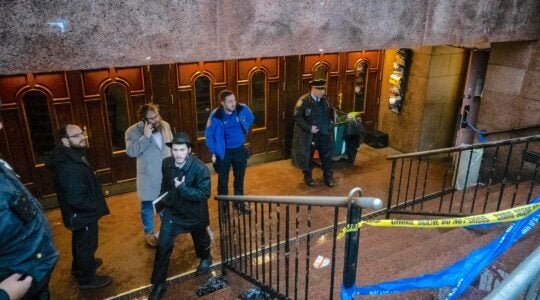Nobody knows what goes on between two people, not even the two people. On Itzchak Marmorstein’s birthday, in 1980, his wife Sharon gave him a gift: an anthology of Abraham Isaac Kook, mystic, poet, and the first chief rabbi of the Yishuv, the early 20th- century settlements that were to become the State of Israel.
The next summer, “we were renting a cottage
Values To Heal America
by the water,” remembers Itzchak of the years they lived in Winnipeg. “No one is in the cottage but me. I was reading Rav Kook and felt my whole consciousness go whooosh! I never felt such an expansion, such as space for thought and spirit.”
A teacher in a Jewish high school, he’d recite Rav Kook with great animation to his friends. “They all got off on it,” says Itzchak. “We started weekly study groups,” even inviting rabbis to come from 5,000 miles away, if only to explain a verse.
Nobody knows what goes on between two people. The Marmorsteins moved to Jerusalem and back to Canada. Sharon and Itzchak divorced in the 1990s, opting to live near each other in the Vancouver area to make it easier for the children.
A former Israeli soldier, “I made aliyah three or four times,” says Itzchak.
By last December, the children were grown and “didn’t need me to live near them anymore,” says Itzchak, now 56. Although privately ordained by several rabbis, including Shlomo Carlebach, you could talk to Itzchak for an hour and not know what kind of work he was out of. He was a train looking for a track.
The cover had come off the old Rav Kook book, everything except for “Abraham” on the spine. After more than 25 years it was sutured together with adhesive tape like an old siddur. In the margins were Itzchak’s notes — words highlighted in yellows and reds, asterisks and slashes — like so many Roman candles.
Everything he owned, he said, could fit into his small Chrysler PT Cruiser, and he filled that car with clothes, a guitar, a Tom Waits CD and Rav Kook. He was ready to leave, one more time.
The summer before, at a Yiddish culture festival in Toronto, Itzchak met Greg Wall, an East Coast jazz musician who was intrigued by the adventurous sounds of what might be called chasidic new wave. Wall and Itzchak agreed that if Itzchak ever made it to New York, Wall’s band could play a jazzy backdrop while Itzchak read —– performed — Rav Kook’s poetry in the fashion that Jack Kerouac and the 1950s beats would read poetry in coffeehouses to the sounds of bebop.
“It’s a year of shmittah,” Itzchak says, referring to the current sabbatical of the land to lie fallow, as fallow as he was feeling. “But how am I going to pay for this? I’m a little under-employed.
“Then, in the mail, which I was avoiding because of the bills, came an envelope. I felt it. There was something in it, a credit card for Marmorstein Leisik. Who? Then I realized, there were all those times, passing through a mall or airport, when someone is offering a free shirt, or some gift, if you apply for a credit card. Usually, a month later I’d get a letter saying, ‘Sorry, you can’t get credit.’ But this credit card company probably thinks Marmorstein is my first name and, and with my handwriting, that Leisik is my last name. Marmorstein Leisik, who doesn’t exist, doesn’t have bad credit. So they give Brother Leisik a $5,000 credit card: New York!
“Do you understand how driven I am to do this?”
He left in mid-December, “a Chanukah tour,” driving on snow tires over the Trans-Canada Highway, stopping to visit his daughter Raizy for one night of candles; then through rain, blizzards and sleet, to friends in Calgary, for more candles; to friends in Winnipeg, for another night of candles; hundreds of miles by day, and down into the United States, over North Dakota’s snow-covered prairie, to Minnesota, to Wisconsin, and to Chicago for the eighth night.
“Sad and lovely,” wrote the poet, Itzik Manger, “are the roads of the Holy Book.”
Itzchak slept on an air mattress in a friend’s apartment on Adam Clayton Powell Boulevard, in what Itzchak calls “SoHa,” South Harlem. He did a poetry gig in Williamsburg with Wall’s band, The Later Prophets.
“Listen to the world,” says Itzchak, looking out The Jewish Week windows into the Manhattan streets. “All this talking and it’s all craziness. Rav Kook is about a whole different kind of talking.”
Itzchak, his eyes shadowed by a jaunty, weathered hat, his face somewhat bearded, picks up his Rav Kook and starts with a theatrical passion: “ ‘We [Jews] began to say something of immense importance to ourselves and to the world, but we have not yet completed it. We’re in the midst of our discourse. We do not wish, we are unable to stop. Only a people that has completed what it started can descend from the stage of history, when its vision has been fully disclosed to the world.’ ”
During the First World War, says Itzchak, “Rav Kook was writing the most dense book of Kabbalah, but about the aleph-bet. The whole world was falling apart and he wanted to rebuild it, letter by letter.”
Itzchak picks up a second book by Rav Kook, almost as worn as the first, and starts to read aloud: “ ‘From a distant world, full of illumination …. The news reaches me like the dew, full of the delight of Heaven, guiding me to the hidden Eden. There the treasure is stored. All the faces there are joyful … Nothing is hidden, everything in known, every soul is full of love for all…’ ”
While in New York, Itzchak heard the news of a Jerusalem Arab bursting with gunfire into the Mercaz HaRav Kook yeshiva, killing eight, wounding many, blood staining the floor, the walls, the land itself.
“I’ll dedicate my performances of Rav Kook to aliyat nishmatam, the elevation of their souls. You’ll help me, won’t you?” Itzchak asks as he gives me a quizzical look.
Sad and lovely, the poets say, are the roads of the Holy Book.
jonathan@jewishweek.org
The New York Jewish Week brings you the stories behind the headlines, keeping you connected to Jewish life in New York. Help sustain the reporting you trust by donating today.




